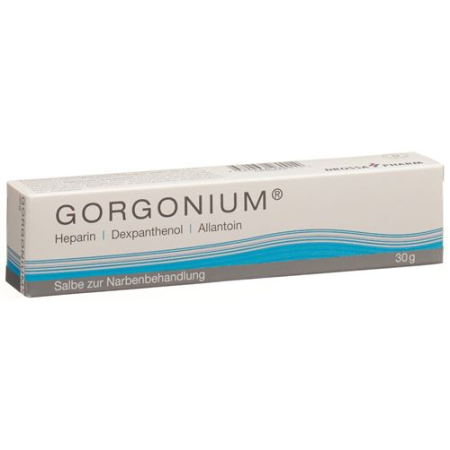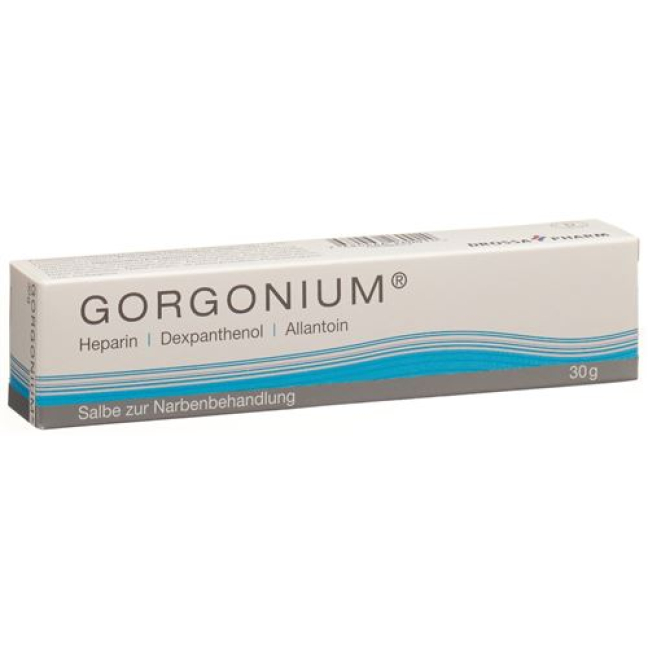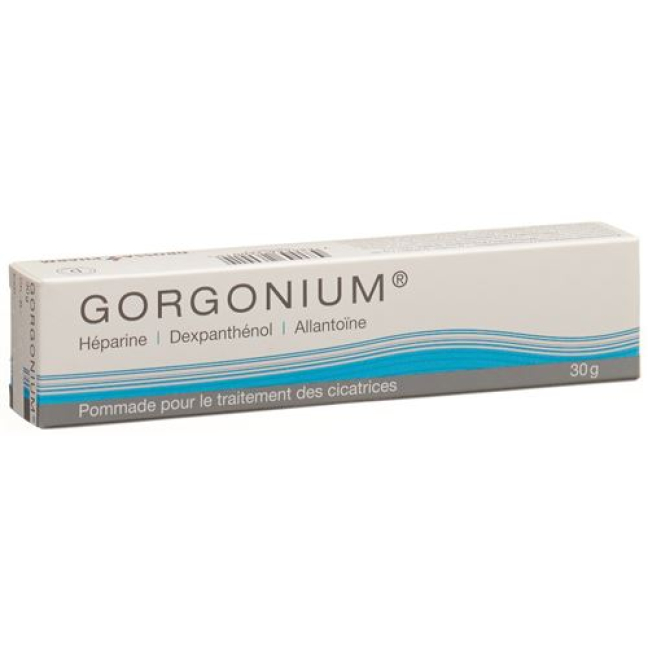Gorgonium Ointment Tb 30 g
-
32.37 USD

- Availability: In stock
- Brand: DROSSAPHARM AG
- Product Code: 6002201
- ATC-code C05BA53
- EAN 7680466260014
Ingredients:
Active ingredients: 500 IU heparin sodium, 100 mg dexpanthenol, 50 mg allantoin Excipients: Hydrogenated peanut oil, cetylstearyl alcohol, sodium laurilsulfate, sodium cetylstearyl sulfate, disodium phosphate, potassium monohydrogen phosphate, propylene glycol, collagen, sodium benzoate (E211), citric acid, benzyl alcohol, lavender oil, purified water
Description
What is Gorgonium Ointment and when is it used?
Gorgonium Ointment is a scar ointment that contains the active ingredients heparin, dexpanthenol and allantoin. The active ingredients contained in Gorgonium Ointment promote blood circulation in the tissue and promote the development of skin tissue.
Gorgonium Ointment is used for the follow-up treatment of scar tissue (so-called bulge scars [= excessive scar formation], scars after acne and scars after operations).
What precautions should be taken?
Protect scars from sun exposure.
When should Gorgonium Ointment not be used?
Gorgonium Ointment should not be applied to open or unhealed wounds.
Gorgonium Ointment must not be used in the case of known heparin-induced / associated thrombocytopenia (HIT, heparin-induced lack of blood platelets).
Grogonium Ointment contains peanut oil and should not be used if you are allergic to peanut or soy.
Do not use on children under 6 months.
In case of hypersensitivity to one of the active ingredients or one of the excipients, Gorgonium Ointment should not be used.
When is caution required when using Gorgonium Ointment?
Gorgonium Ointment should only be used once the wound has healed safely. Do not apply to eyelids and mucous membranes.
Gorgonium Ointment contains peanut oil, cetearyl alcohol, propylene glycol (50 mg per 1 g of ointment), benzyl alcohol (15 mg per 1 g of ointment), sodium liuril sulfate (1 mg - 5 mg per 1 g of ointment) and sodium benzoate (0.03 mg - 0.3 mg per 1 g ointment). Gorgonium Ointment should not be used if you are allergic to peanuts or soy. Cetearyl Alcohol may cause local skin irritation (eg contact dermatitis). Propylene glycol may cause skin irritation.
Benzyl alcohol can cause allergic and mild local reactions.
Sodium Lauryl Sulfate may cause local skin reactions (such as a stinging or burning sensation) or increase skin reactions caused by other products applied to the same skin area.
Sodium benzoate may cause local irritation.
Due to the heparin contained in Gorgonium Ointment, an interaction with medicines that inhibit blood clotting (this includes medicines for blood thinning as well as many painkillers and rheumatism medicines) cannot be completely ruled out. However, a resulting increased risk of bleeding is unlikely, since heparin hardly gets into the bloodstream when Gorgonium Ointment is used correctly. If you are taking or using anticoagulants and Gorgonium Ointment at the same time, you should ask your doctor for advice before use.
Tell your doctor, pharmacist or druggist if you:
• suffer from other diseases,
•have allergies or
• take other medicines (including those you bought yourself!) or use them externally!
Can Gorgonium Ointment be used during pregnancy or while breastfeeding?
Systematic scientific investigations were never carried out. It is not known whether the substances pass into breast milk. If you are pregnant, want to become pregnant or are breastfeeding, you should only use Gorgonium Ointment after consulting your doctor.
How do you use Gorgonium Ointment?
Use only on intact skin and not on mucous membranes.
Adults and children from 2 years: Unless otherwise prescribed by the doctor, apply Gorgonium Ointment several times a day to the areas to be treated and the surrounding skin areas and rub in gently.
For adults, it is recommended for bulging scar strands to also apply the ointment thick as a knife under a bandage overnight. This type of application is not suitable for children, since an increased absorption of the active ingredient through the skin cannot be ruled out, especially in small children due to the sealing effect of the bandage. The large-scale application in children under 12 years and any application in children under 2 years should only be carried out on the basis of a doctor's prescription.
Follow the dosage given in the package leaflet or prescribed by your doctor. If you think the medicine is too weak or too strong, talk to your doctor, pharmacist or druggist.
What side effects can Gorgonium Ointment have?
Rare (affects 1 to 10 users in 10,000)
In rare cases, local allergic reactions may occur. In such cases, treatment should be discontinued.
If you notice side effects, contact your doctor, pharmacist or druggist. This also applies in particular to side effects that are not listed in this leaflet.
What should also be noted?
Durability
The medicinal product may only be used up to the date marked “EXP” on the container.
Storage Notice
Keep out of the reach of children, at room temperature (15°C-25°C) and in the original packaging.
Your doctor, pharmacist or druggist can provide you with further information. These people have the detailed information for specialists.
What does Gorgonium Ointment contain?
Active ingredients: 500 IU heparin sodium, 100 mg dexpanthenol, 50 mg allantoin
Excipients: Hydrogenated peanut oil, cetylstearyl alcohol, sodium laurilsulfate, sodium cetylstearyl sulfate, disodium phosphate, potassium monohydrogen phosphate, propylene glycol, collagen, sodium benzoate (E211), citric acid, benzyl alcohol, lavender oil, purified water
Registration Number
46626 (Swissmedic)
Where can you get Gorgonium Ointment? What packs are available?
In pharmacies and drugstores, without medical prescription.
Gorgonium Ointment: 30 g and 60 g tubes
Marketing Authorization Holder
Drossapharm AG, Basel





